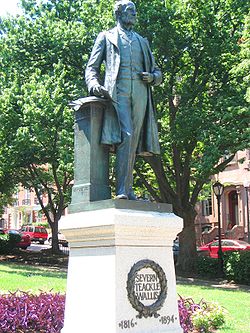
Severn Teackle Wallis
Encyclopedia

Biography
Severn Wallis graduated from St. Mary's College, Baltimore, in 1832, studied law with William WirtWilliam Wirt (Attorney General)
William Wirt was an American author and statesman who is credited with turning the position of United States Attorney General into one of influence.-History:...
, attorney general, and with John Glenn. In 1837 Wallis was admitted to the bar.
Wallis early developed a taste for literature and contributed to periodicals many articles of literary and historical criticism, also occasional verses. He became a proficient in Spanish literature and history and was elected a corresponding member of the Royal Academy of history of Madrid
Madrid
Madrid is the capital and largest city of Spain. The population of the city is roughly 3.3 million and the entire population of the Madrid metropolitan area is calculated to be 6.271 million. It is the third largest city in the European Union, after London and Berlin, and its metropolitan...
in 1843.
In 1846 he was chosen a fellow of the Royal Society of northern antiquaries of Copenhagen.
In 1847 he visited Spain
Spain
Spain , officially the Kingdom of Spain languages]] under the European Charter for Regional or Minority Languages. In each of these, Spain's official name is as follows:;;;;;;), is a country and member state of the European Union located in southwestern Europe on the Iberian Peninsula...
and in 1849 the U. S. government sent him on a special mission to that country to examine the title to the public lands in east Florida
Florida
Florida is a state in the southeastern United States, located on the nation's Atlantic and Gulf coasts. It is bordered to the west by the Gulf of Mexico, to the north by Alabama and Georgia and to the east by the Atlantic Ocean. With a population of 18,801,310 as measured by the 2010 census, it...
, as affected by royal grants during the negotiations for the treaty of 1819.
From 1859 until 1861 Wallis contributed largely to the editorial columns of the Baltimore Exchange, and wrote for other journals.
He was a Whig until the organization of the American or Know-Nothing party, after which he was a Democrat.
In 1861 Wallis was sent to the house of delegates of Maryland, and took an active part in the proceedings of the Maryland Legislature
Maryland General Assembly
The Maryland General Assembly is the state legislature of the U.S. state of Maryland. It is a bicameral body. The upper chamber, the Maryland State Senate, has 47 representatives and the lower chamber, the Maryland House of Delegates, has 141 representatives...
, of that year at Frederick. He was chairman of the committee on Federal relations, and made himself obnoxious to the Federal authorities by his reports, which were adopted by the legislature, and which took strong ground against the Civil War
American Civil War
The American Civil War was a civil war fought in the United States of America. In response to the election of Abraham Lincoln as President of the United States, 11 southern slave states declared their secession from the United States and formed the Confederate States of America ; the other 25...
, as well as against the then prevailing "doctrine of military necessity".
In September of that year Wallis was arrested with many members of the legislature and other citizens of the state, and imprisoned for more than fourteen months in various forts. He was released in November, 1862, without conditions and without being informed of the cause of his arrest.
He then returned to the practice of the law in Baltimore. In 1870, on the death of John Pendleton Kennedy
John P. Kennedy
John Pendleton Kennedy was an American novelist and Whig politician who served as United States Secretary of the Navy from July 26, 1852 to March 4, 1853, during the administration of President Millard Fillmore, and as a U.S. Representative from the Maryland's 4th congressional district. He was...
, Wallis was elected provost
Provost (education)
A provost is the senior academic administrator at many institutions of higher education in the United States, Canada and Australia, the equivalent of a pro-vice-chancellor at some institutions in the United Kingdom and Ireland....
of the University of Maryland
University of Maryland
When the term "University of Maryland" is used without any qualification, it generally refers to the University of Maryland, College Park.University of Maryland may refer to the following:...
.
In December, 1872, as chairman of the art committee of private citizens appointed by the Maryland legislature, he delivered the address upon the unveiling of William Henry Rinehart's statue of Chief-Justice Roger Brooke Taney
Roger B. Taney
Roger Brooke Taney was the fifth Chief Justice of the United States, holding that office from 1836 until his death in 1864. He was the first Roman Catholic to hold that office or sit on the Supreme Court of the United States. He was also the eleventh United States Attorney General. He is most...
.
A statue in his likeness stands in Mount Vernon Square in Baltimore
Baltimore
Baltimore is the largest independent city in the United States and the largest city and cultural center of the US state of Maryland. The city is located in central Maryland along the tidal portion of the Patapsco River, an arm of the Chesapeake Bay. Baltimore is sometimes referred to as Baltimore...
, Maryland.
Published works
Wallis contributed to many periodicals and numerous pamphlets on legal and literary subjects. Wallis also published:- Glimpses of Spain (1849)
- Spain: Her Institutions, Politics, and Public Men (1853)
- Discourse on the Life and Character of George Peabody (1870)
Source
- Appleton's Cyclopedia of American Biography; vol. vi.; pp. 338, 339; Edited by James Grant Wilson and John Fiske; New York: D. Appleton and Company (1889)

